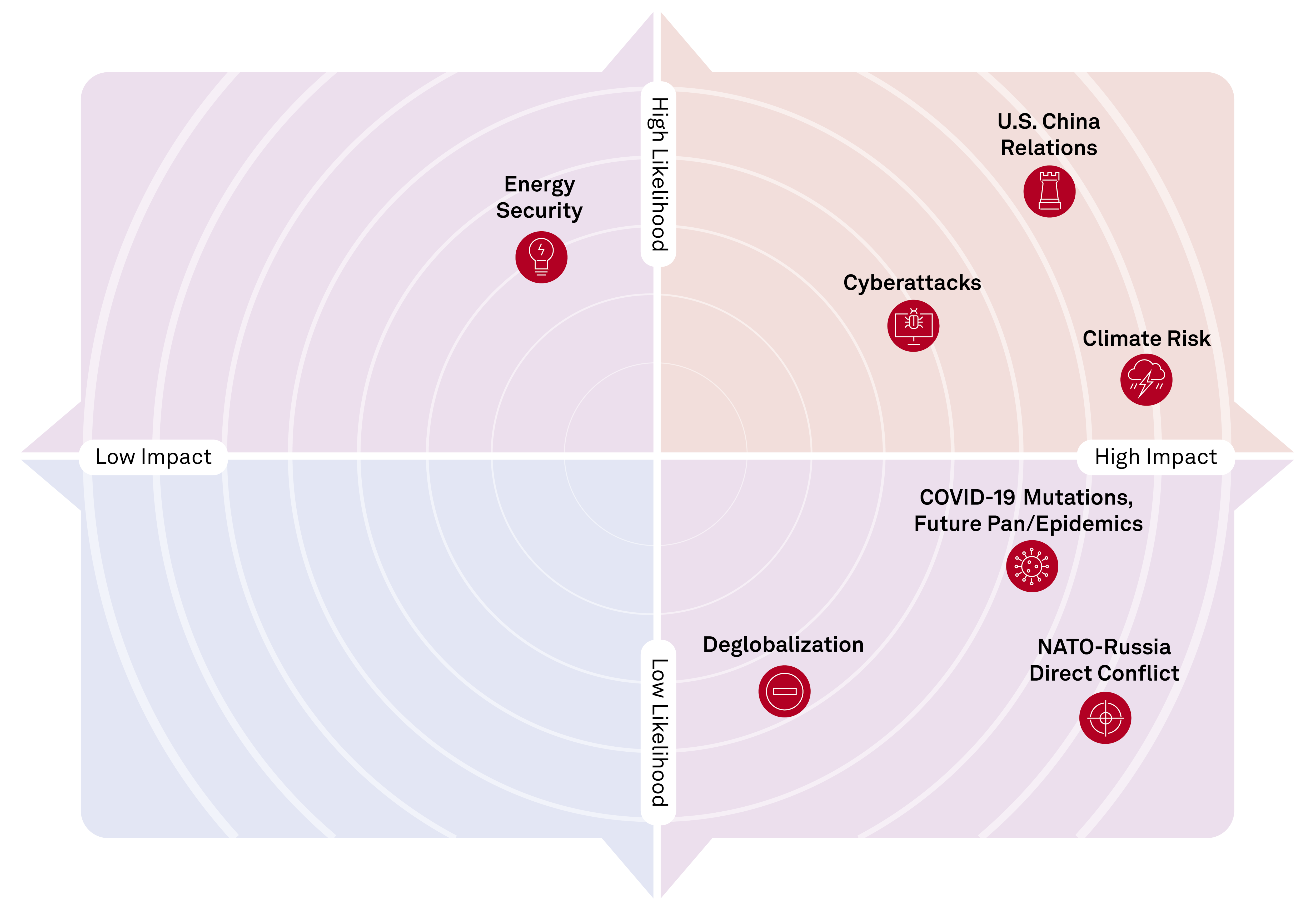Discover more about S&P Global’s offerings
Customer Logins
Obtain the data you need to make the most informed decisions by accessing our extensive portfolio of information, analytics, and expertise. Sign in to the product or service center of your choice.
Customer LoginsContents
Introduction
A world ordered for decades by globalization and geoeconomics has quickly become a world grounded in geopolitical risk. Accumulating shocks such as the COVID-19 pandemic and the Russia-Ukraine conflict have persisted, significantly reorganizing global structures and relationships in 2023.
The world economy is in a precarious position, with impending economic downturns in the US and Europe, and China experiencing its slowest growth in years. While US policy is to compete responsibly with rival superpowers as it pursues its own interests. Geopolitical tensions are increasing.
Energy and climate change continue to be politically polarizing issues, with global progress notably lacking on the climate transition. However, the recent energy price shock in the wake of Russia’s invasion of Ukraine should catalyze decarbonization efforts, and the Inflation Reduction Act provides significant renewables incentives and investment opportunities in the US.
The global response to COVID-19 is another polarizing topic with countless economic and social consequences. Among those consequences is a move toward rethinking globalization as countries look to de-risk.
Cyberattacks are becoming more frequent and severe, and are increasingly being used as a tool of statecraft. The human and financial impact of attacks continues to rise in line with the increasing digitization of critical infrastructure.
In this article, we set out some of the likeliest and most impactful geopolitical risks of 2023.
Russia-NATO tensions
The Russia-Ukraine conflict continues to pose a significant geopolitical risk in 2023. It has initiated a humanitarian crisis and given rise to greater risk exposures in capital flows, trade and commodity markets worldwide.
Geopolitical tensions have been high between NATO and Russia for some time, and Russia’s invasion of Ukraine has NATO-Russia-relations at their most precarious since the Cold War. These relations continue to be tested by the economic sanctions imposed on Russia and the support by NATO membership countries for Ukraine in the form of financial and military aid.
With neither side seemingly likely to produce a conclusive victory in the near term, and a ceasefire or settlement looking improbable, the war persists. While it does, there is always the risk of intentional or accidental escalation.
<span/>A direct global conflict, while unlikely, would have devastating consequences. All sides will be trying to avoid this at all costs, but the unpredictable nature of the conflict, and of Russia President Vladimir Putin’s intentions, has given rise to significant risk.

Understand the Europe-Africa trade and investment relationship in the three- to five-year outlook
Cyber attacks
Cyberattacks are a growing geopolitical risk, becoming larger, more intricate and more relentless. They are a significant threat to individual organizations and national security.
The US is facing a widespread ransomware issue, and the US government is demanding stricter safeguards to help protect against such threats. The European Parliament website was made inaccessible for several hours in November 2022, with a pro-Kremlin group claiming responsibility for the cyber attack. Moldova’s government suffered a data breach as recently as January 2023, and Australia’s second-largest telecom company, Optus, suffered a data breach in September 2022.
The digitization of critical national infrastructure (CNI) means that many essential services, including power grids, water supply networks and transportation systems, are increasingly vulnerable to cyberattacks. A successful cyberattack on any of these systems can have severe consequences, including loss of life and economic damage.
The repercussions of persistent cyberattacks could have a wide-reaching impact on financial markets and the economy. Government networks, private sector networks and infrastructure are all susceptible to hacking and espionage.
<span/>International cooperation to effectively address cyberattacks is challenging given the complex geopolitical relationships between many countries. As geopolitical tensions rise between some of the world’s major powers, such as NATO and Russia, major cyberattacks as a tool of statecraft become ever more probable.
US-China strategic competition
A number of unresolved conflicts and competitions will be sources of geopolitical risk in 2023. Lead among these is a de-risking between US and mainland China.
China’s increased military presence in the South China Sea, technological advancements and ongoing trade tensions with the US have given rise to geopolitical tensions.
Despite the multidimensional relationship between the US and China, particularly across trade, supply chain and economic spheres, US-China relations have become more complex in recent years. Recovery in trade and the commercial relationship between the US and mainland China likely remains the default Chinese policy direction in the one-year outlook, in spite of potential headline making disruptions to diplomatic engagement. China and the US are committed to pursuing a policy of competing responsibly with each other, but risk of hardening relations remain.
Trade tensions escalated in 2018 when the US imposed tariffs on Chinese imports to reduce its trade deficit with China. This precipitated further trade conflict between the two countries that has significantly affected global trade. In December 2018, the US and China engaged in trade negotiations, but talks broke down in May 2019. The nations eventually signed the Phase One trade deal in January 2020. The US has since placed restrictions on exports to China, particularly regarding technology, due to concerns about intellectual property, and this has contributed to trade tensions.
The growing trade in LNG between the two countries has also affected US-China relations. China has become one of the largest importers of US LNG, which has helped to reduce the US trade deficit with China. This has caused concern in some quarters, as it has given China a significant amount of leverage over the US energy sector.
The nations also have areas of overlapping interest and conflict. China has threatened to sell US Treasury bonds, and the US has blacklisted some Chinese technology companies. There is growing concern that US-China trade tensions could escalate into further financial decoupling. Such a conflict would cause significant disruption to global financial markets.

Let's Discuss Your Challenges
Renewed pragmatism – cooperation, not deglobalization
A variety of factors has given rise to questions around the benefits of increased international movements of goods, services, people, capital, technology and ideas in recent years. The growth of nationalism, protectionism and populist movements in recent years has created an environment of increasing uncertainty and could potentially lead to deglobalization - a reversal or slowdown of globalization.
The COVID-19 pandemic exposed the vulnerability of many countries that were heavily reliant on imported goods, with nations worldwide enforcing border closures and restrictions on international travel. Governments are increasingly keen to diversify their sources of imports as a protective measure to reduce their dependence on a single trading partner. Despite this, businesses remain interested in cross-border economic engagement. Even amid heightening superpower tensions, the US and China continue their robust bilateral trade.
S&P Global Market Intelligence trade data shows that year-on-year growth in the value of exports is slowing down in most of the top 10 economies, except for Brazil. China has seen a significant slowdown in exports, although easing COVID-19 restrictions could change that.
The anti-globalization movement poses a threat to economic growth and international relations, but a renewed trend toward increased pragmatism and cooperation, fueled in part by the reaction to Russia’s invasion of Ukraine, has begun to emerge. That new pragmatism would counter movement toward a more closed world of self-contained economies, where governments protect their own industries and citizens from foreign competition, e.g., by implementing subsidies and other incentives that favor domestic producers over foreign ones.
<span/> Still, protectionism and the rejection of multilateral trade remain real, albeit moderate, geopolitical risks. Although global trade contraction is likely in 2023, GTAS Forecasting , a part of S&P Global, expects trade recovery to start in 2024, returning to a long-term stable growth path.
Climate risk
Climate risk is one of the world’s most politically polarizing topics, and one of the biggest geopolitical risks of 2023. Climate risk will have far-reaching impacts on national security and global stability, and the effects of climate change are already apparent in the form of extreme weather events, species extinction, rising sea levels and growing poverty in developing countries.
Climate change has resulted in more frequent and severe weather events such as hurricanes, droughts, floods and wildfires, which have damaged infrastructure and disrupted supply chains, leading to resource scarcity and economic instability.
It has led to reduced precipitation levels in some parts of the world, which in turn has led to water scarcity that is raising geopolitical tensions between countries such as Turkey, Syria and Iraq. More frequent and severe droughts in sub-Saharan Africa have reduced the availability of water for agriculture and drinking.
Water scarcity in South America is worsening operational disruption, protests, and contract revision risks for manufacturing companies, and worsen the risk of lower crop yields and higher food prices. Droughts are likely to cause an ongoing constraint to Latin America's contribution to meet global energy transition targets. Brazil’s agricultural sector, for example, experienced USD9 billion in losses in 2021 because of drought.
Geopolitics plays a crucial role in facilitating global cooperation to address climate change, with 196 countries bound by the Paris Agreement on climate change adopted in 2015. If insufficient collective action is taken to halt global warming, the effects could become catastrophic: mass displacement, food and water insecurity, and civil unrest, to name but a few.
At the same time, the passage of the US Inflation Reduction Act has dramatically increased investment in renewable energy in the world’s largest economy.
<span/> Countries that rely heavily on fossil fuels are likely to resist the shift toward renewable energy, and such resistance could lead to geopolitical tensions as countries compete to secure affordable energy.
Energy security
Having available and accessible energy resources is crucial to a country's economic development. Several of the aforementioned themes in this article — namely climate change, cybersecurity threats and the war in Ukraine — have caused increased concern for energy security worldwide, and this remains a top 2023 geopolitical risk.
Europe is coping with a huge challenge after losing access to an abundance of cheap Russian gas for households and industries. European energy security has been under threat since Russia’s invasion of Ukraine began in February 2022, with European gas prices reaching all-time highs in August that year owing to the relentless drive to secure supplies.
The turmoil of 2022 has brought coal plants back online in some countries where they were previously shuttered or scheduled to be shut down, posing a threat to the clean energy transition. While implementing reforms to combat climate change is on the long-term transition agenda, securing affordable energy is an immediate priority for many countries to respond to short-term challenges.
<span/>The digitization of the energy sector has made energy infrastructure vulnerable to cyberattacks. These attacks could cause significant damage to critical infrastructure and disrupt energy supply, and they are one of the top geopolitical risks of 2023 in their own right.
COVID-19 pandemic fallout, possible future pan/epidemics
The social and economic impact of the pandemic is still being felt. Mutations and/or the emergence of new viruses or diseases, the future of global health governance and the effect on supply chains are just a few of the lingering risks that could cause further disruption in 2023 and beyond.
COVID-19 has significantly affected global trade, with many countries closing their borders and restricting travel to control the spread of the virus. This uncertainty means the risk of future lockdowns and manufacturing disruptions remains.
Supply chains, which were severely disrupted by COVID-19, have begun a gradual recovery as COVID-19 restrictions globally are reduced. Supply chains are now facing surging demand for certain types of goods, worker shortages (exacerbated by COVID-19-related sick leave) and preexisting political pressures. Companies’ resilience to supply chain disruptions will be strongly influenced by whether they are speculative or investment grade. More than 55% of companies globally have a credit rating lower than ‘b+,’ and a global recession would likely lead to deteriorating credit and a higher proportion of speculative-grade corporates. However, national economies are showing signs of resilience, particularly in the US and Europe.
The pandemic also fostered increased protectionism, with some countries implementing trade barriers and tariffs. Such policies could raise geopolitical tensions and lead to a more fragmented global trading system, with negative implications for economic growth and geopolitical stability.
<span/>COVID-19 has also exposed weaknesses in the global health governance system and highlighted the need for greater investment, including in disease surveillance systems and vaccine research and development, with many countries struggling to coordinate their responses to the pandemic effectively. This has led to a lack of trust and cooperation between nations, which could have negative implications for future health crises. If these issues are not addressed, the world faces the risk of further COVID mutations, particularly into highly transmissible variants, as well as further pandemics.
Conclusion
The tests ahead are interconnected and have vast potential commercial impacts. The trajectory of the Russia-Ukraine conflict will affect Russia’s ability to trade with NATO members and the availability of cheap Russian gas to parts of the world.
A boost in state-sponsored cyberattacks will have governments and organizations worldwide on high alert for signs of international tensions, with vital infrastructure such as power grids and water supply networks being targeted.
Increased superpower tensions have a considerable impact on the global economy. Any disruption in the trade relationship between the US and China, for instance, will affect us all.
Trade wars and heightened international tensions could slow the movement toward increased international cooperation and trade flows, with S&P Global Market Intelligence data already showing a drop in exports in many economies.
Climate change, whether in the form of extreme weather events or rising sea levels, is already disrupting trade routes and damaging infrastructure. This geopolitical risk has the potential to significantly impact national security and global stability.
Sustained energy security concerns spell bad news for the global economy and increase fiscal, social and political challenges for governments. A major surge in COVID-19 cases and/or new mutations of the virus could also further weaken national and international supply chains further and disrupt manufacturing and exports, fueling global shortages.
Given that these geopolitical risks are interconnected, the strategies to tackle them should likewise be interconnected.
Meaningful progress on the climate transition, for instance, requires international cooperation, such as adherence to the Paris Agreement. The growing tensions between major powers will hinder global efforts to combat climate change.
The international cooperation needed to effectively address geopolitical risks such as cyberattacks and COVID-19 will always be challenging to achieve owing to the complex geopolitical relationships between many countries. But continued bilateral trade between clashing countries shows that partnerships are possible even when geopolitical tensions are on the rise.
We are arguably in the most economically disruptive period in decades, and collaboration is key to navigating this disruption. With geopolitics playing an increasingly important role in global business, it is critical, now more than ever, for companies to have geopolitical risk analysis firmly embedded into their strategy and governance.
Figure 1: Likelihood and Impact of Top 2023 Geopolitical Risks
<span/>Geopolitical risk FAQs
{}
{"items" : [
{"name":"share","enabled":true,"desc":"<strong>Share</strong>","mobdesc":"Share","options":[ {"name":"facebook","url":"https://www.facebook.com/sharer.php?u=http%3a%2f%2fwww.spglobal.com%2fen%2fenterprise%2fgeopolitical-risk%2f%3futm_campaign%3dPC024173%26utm_medium%3dreferral%26utm_source%3dsphome","enabled":true},{"name":"twitter","url":"https://twitter.com/intent/tweet?url=http%3a%2f%2fwww.spglobal.com%2fen%2fenterprise%2fgeopolitical-risk%2f%3futm_campaign%3dPC024173%26utm_medium%3dreferral%26utm_source%3dsphome&text=Top+Geopolitical+Risks+of+2023+%7c+S%26P+Global","enabled":true},{"name":"linkedin","url":"https://www.linkedin.com/sharing/share-offsite/?url=http%3a%2f%2fwww.spglobal.com%2fen%2fenterprise%2fgeopolitical-risk%2f%3futm_campaign%3dPC024173%26utm_medium%3dreferral%26utm_source%3dsphome","enabled":true},{"name":"email","url":"?subject=Top Geopolitical Risks of 2023 | S&P Global&body=http%3a%2f%2fwww.spglobal.com%2fen%2fenterprise%2fgeopolitical-risk%2f%3futm_campaign%3dPC024173%26utm_medium%3dreferral%26utm_source%3dsphome","enabled":true},{"name":"whatsapp","url":"https://api.whatsapp.com/send?text=Top+Geopolitical+Risks+of+2023+%7c+S%26P+Global http%3a%2f%2fwww.spglobal.com%2fen%2fenterprise%2fgeopolitical-risk%2f%3futm_campaign%3dPC024173%26utm_medium%3dreferral%26utm_source%3dsphome","enabled":true}]}, {"name":"rtt","enabled":true,"mobdesc":"Top"}
]}










